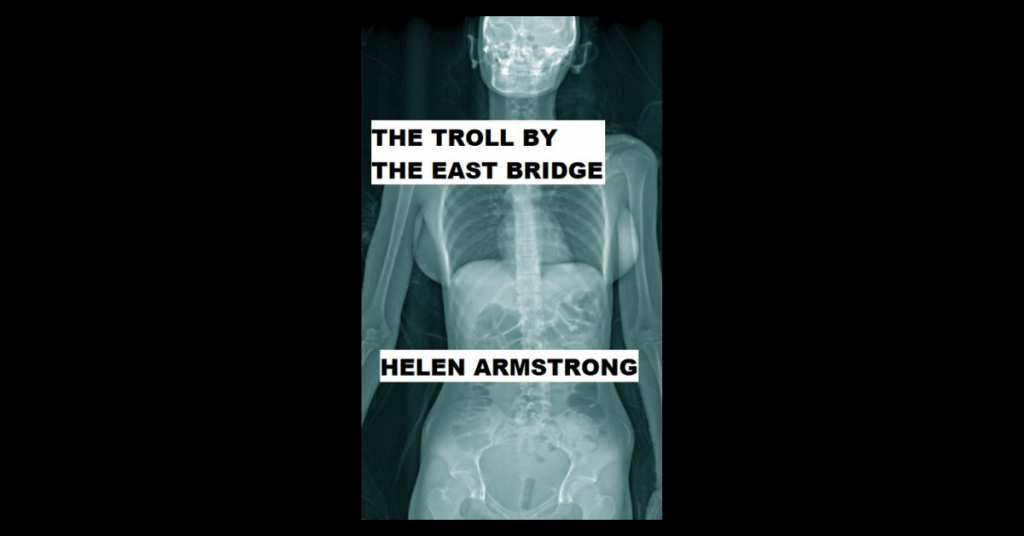The thing that very many people fail to grasp about city planning is that a lot of planning goes into it: ha ha. This is always my gag at parties and it very often falls upon deaf ears. I’m uncertain whether people don’t want to find me funny, or if they just don’t understand my humor.
When the troll by the East Bridge – creatively named by Richardson, the city planner before me, whose interests included golfing and beer and golf clubs – demanded a sacrifice or he’d torch the town, people certainly weren’t laughing anymore. And they weren’t laughing when I walked right up to the troll and he ate me – in small pieces, of course.
Maybe he had gum disease: ha ha.
The feeling of having your ligaments torn apart from one another and having your guts ingested is unique, as you might imagine. Have you had a root canal? I haven’t, but I’ve heard terrible things.
It’s also interesting how the mind doesn’t simply disappear. Our thoughts float around through and outside of our brains, our whole lives just- humming around inside our skulls. The synapses light up like the fireflies that children like to catch in the dusk at Hawthorne Field after the baseball games have all wrapped up for the evening.
Those summer nights are the best, and perhaps it would be easier to describe this feeling of being torn limb from limb not through comparison but rather, by contrasting it. Example: it does not feel like watching children catch fireflies at Hawthorne Field in the dusk.
Example: it may feel more like being the fireflies, captured in a mason jar and forced to suffocate.
The mind doesn’t simply disappear. It scatters. The thoughts that spend most of their days floating around Hawthorne-Field-my-brain-my-skull-et-cetera just kind of…
So forgive me if I’m a little all over the place.
Let’s see – I got my start as a city planner after I finished my undergrad degree in Business Administration. I loved college and as soon as I landed on the hard pavement of the real world, I wanted to scramble back through the glass doors of academia and into my seat in the front of the class again.
So I applied for a Master’s program, and a few years later wound up on the pavement once more but this time, with a degree in Urban Planning. It didn’t make the landing any softer!
People ask me what I do. I tell them: I gather and analyze data to discover the needs of the population and from there, develop both short- and long-term solutions. I review and solicit plans from developers. I know the zoning laws and other regulations – so that you-don’t-have-to. You see?
Frank thinks it’s a great profession, but he’s an artist, so of course he can think that because it pays the bills. The bills that support his painting and sculpting, and recently he’s been getting into tile-making. Which you can buy at the farmers market which I found the space for.
City planners love sustainability. I love sustainability. I was the one behind the rain gardens you see by the roads and in developments. What is a rain garden?
A rain garden absorbs the runoff rainwater from roofs and driveways and lawns and patios. From the sky. According to some studies, they remove up to 90% of the chemicals and 80% of the sediments from rainwater runoff.
That’s a good thing. It means more water soaks into the ground.
That’s a good thing.
That’s a good thing.
See it sinking down, now.
Frankie also stands up for me because he loves me. I don’t mean, in my last few moments of consciousness on this realm – or, perhaps, any realm – to indicate that he is anything less than a gracious and loving partner. We did not meet at a gay bar. We met in the library. We were both checking out books on gardening.
Neither of us are gardeners.
Go figure, ha ha.
Is there a joke about green thumbs here?
Perhaps. But I don’t have the time.
I’d like to make it clear how important it is to invest in renewable energy and open spaces in our town. I know that it can feel hopeless, at times, to be up against climate change, because there’s Al Gore out there and ice caps melting, sloshing water up onto the land and killing millions of people, like they’re tiny ants. We can drown just as quickly as ants, is a fact-that-is-not-fun.
Their brains must scatter as well but into the ocean, and so the water becomes a vast repository of all the knowledge and experience that everyone whose lives it’s claimed has had. Picture that: krill floating among the memories of prom nights, and a whale may accidentally swallow the whole of a brain surgeon’s knowledge, which she’ll then spout out and fling into the air, careless with it.
Perhaps the troll could become the next city planner.
Wouldn’t that be something? I don’t think he’d fit behind my desk, ha ha.
Frank would think that’s funny, but it’s more you that I’m interested in.
What’s the point? The rain gardens are great, the farmer’s market draws people in from out-of-town-if-you-can-believe-it. Is a legacy only as worthwhile as the people around to make it into one would consider it to be?
I’ll tell you something important. No one cares about local issues.
I’ll tell you something else important because I think I may be running out of time. When they made it the law of the land he proposed to me but we never got married.
We’re still engaged.
I guess I’m old-fashioned. I guess I didn’t want to hear you all talk.
And set to the tune of Simon & Garfunkel as that is what is playing in my head in my last moments: last last last:

